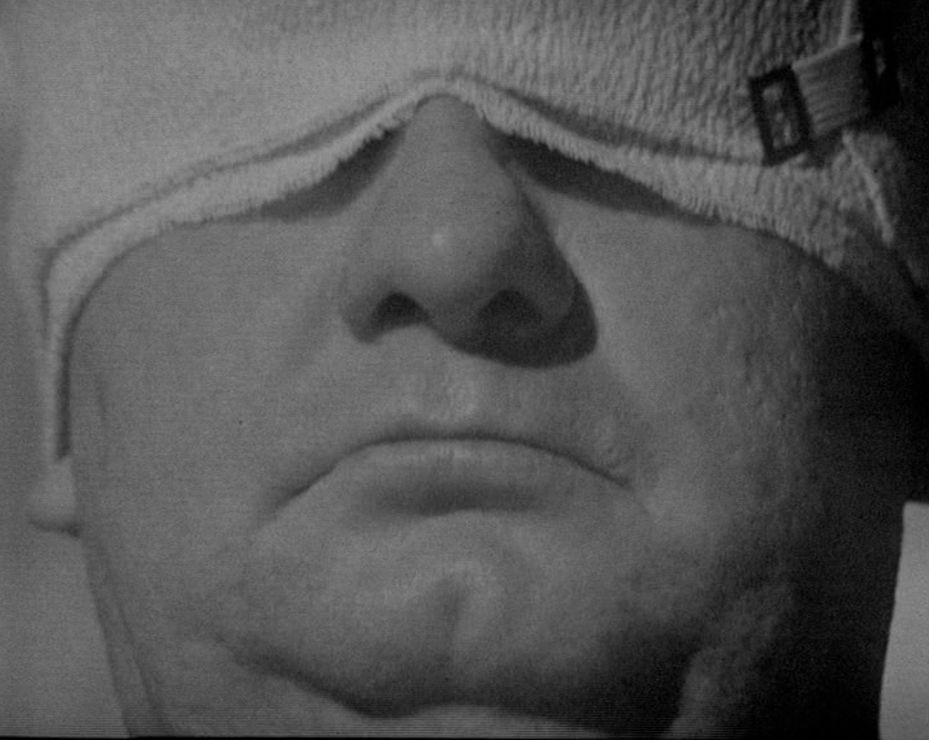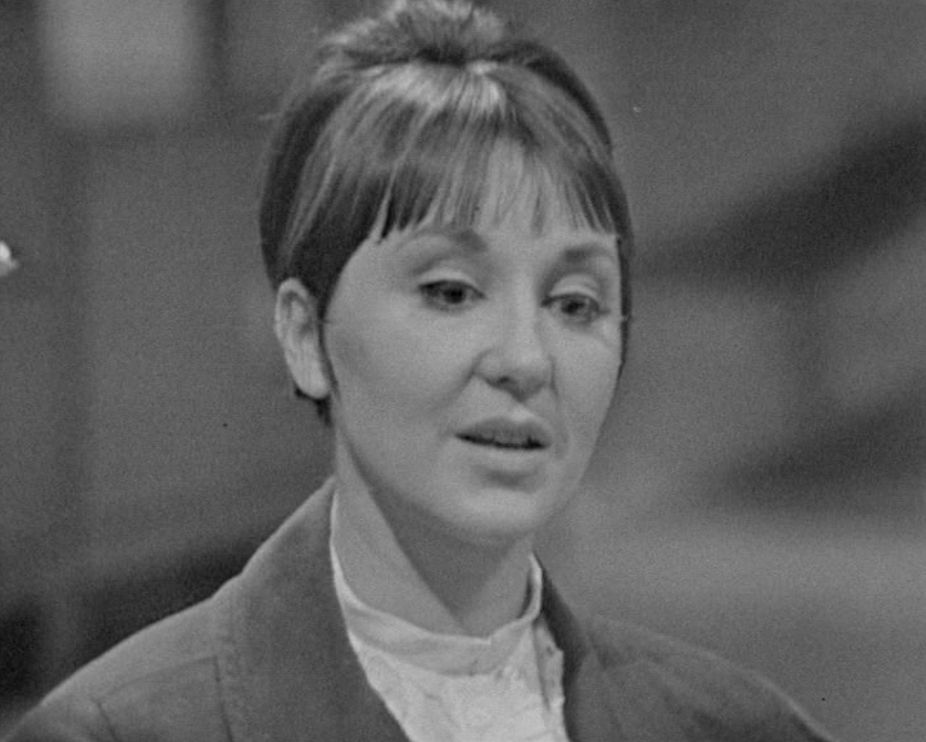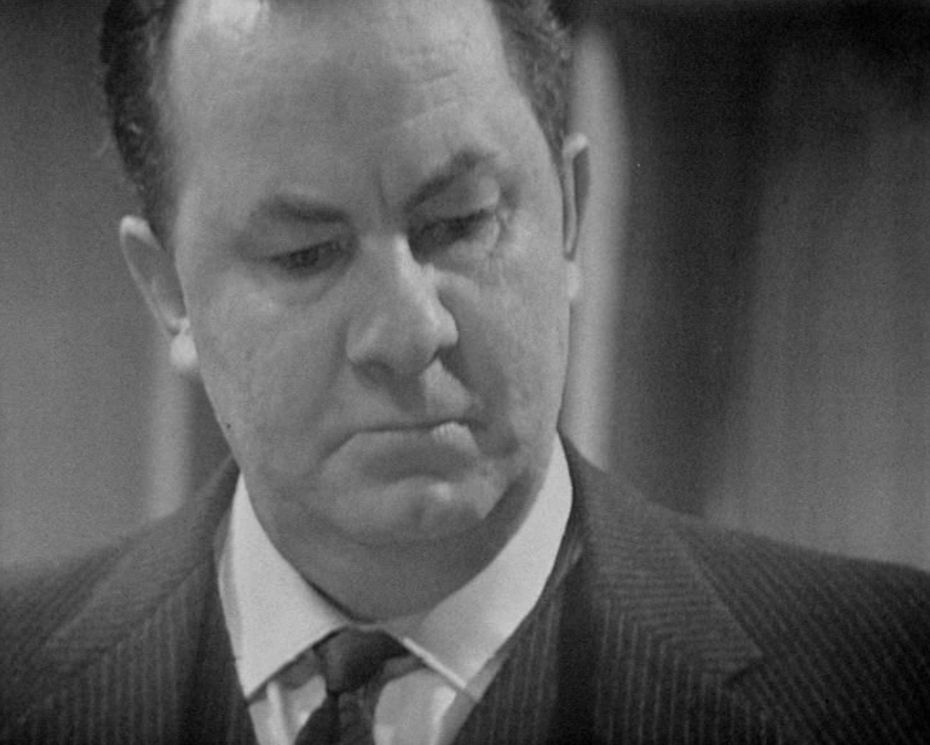
Disson (Leo McKern) seems to have a perfect life. A self-made millionaire, he has a beautiful new wife, Diana (Jennifer Wright), has welcomed his brother-in-law, Willy (Charles Gray), into the business and has engaged a bright and efficient new secretary, Wendy (Vivien Merchant). And yet ….
Broadcast in March 1965, Tea Party was a prestigious commission for Pinter. Part of a Eurovision project, entitled The Largest Theatre In The World, it saw the play performed in thirteen separate counties over the course of a single week (with each county either tackling their own translated version or broadcasting a subtitled copy of the UK transmission).
Disson is a ruthlessly efficient man, beginning the play by proudly informing Wendy about the various products his company produces. That they’re all bathroom related strikes a humorous tone (reinforcing this point, on the way to his office she passes several prominent displays of toilets and baths). As you might expect, this light tone simply softens us up for the darkness to follow.
Disson might react in shock to the revelation that Wendy was forced to leave her last job because her previous employer wouldn’t stop touching her, but the way that director Charles Jarrett has already begun to focus on Wendy as a sexual object (foregrounding her legs whilst relegating Disson to the background) provides us with a clear pointer about one of the play’s key themes.
Considering the period (this was a time when television cameras were bulky and difficult to handle) Jarrett’s direction has a surprising fluidity. Interesting shot compositions abound – from this first scene (with POV shots from Wendy’s perspective) to later in the play (several sweeping tracking shots catch the eye).
Pinter remarked on the way that Disson was a marked man right from his first appearance. This is very much the case, which means it doesn’t take long before he starts to unravel before our eyes. And as the play progresses there’s a definite blurring of reality – some of what we see is the truth, whilst the remainder is no more than Disson’s fevered imaginings. How to differentiate between the two? As so often with Pinter the individual viewer is left to draw their own conclusions.

This means that we’re left with some intriguing mysteries. Diana and Willy have a very close bond – is this simply a natural connection between brother and sister, the hint of something incestuous or are we being invited to consider the possibility that Willy is no relation at all? Also, Disson’s two children, Tom and John (Peter and Robert Barlett) possess an uncomfortable stillness at times. Again, the reason for this is opaque – a sign of malevolence or are they simply ordinary children viewed through a confusing prism by the increasingly befuddled Disson?
Pinter seemed quite confident that the audience wouldn’t have any problems following the play. Talking to the Daily Mirror (who dubbed him one of Britain’s most controversial playwrights) on the day of transmisson, he stated it was simply a story about the relationship between a man and his new secretary, albeit one “with a strong sex theme”. The same article offered up a few more nuggets of interest, chiefly that it took Pinter a month to write and that it was extensively edited by Jarrett (understandable, given the scope of the production).
Performances, as you’d expect, are very strong. McKern – always a favourite actor of mine – doesn’t disappoint as Disson. His final collapse (by the end of the play he’s reduced to a catatonic state) is deeply disturbing, but then so are numerous smaller moments along the way which suggests a crisis is looming.
McKern’s scenes with Vivien Merchant crackle with an uneasy sexual tension. Given Merchant’s familiarity both with Pinter and his work (she was his first wife) it’s possibly not surprising that she seems so connected to the material. Although they didn’t divorce until the late seventies, their marriage (due to Pinter’s extra-marital affairs) had already begun to flounder by the time of Tea Party, which only serves to give her scenes a little extra frisson.
Jennifer Wright has the less rewarding female role, although it’s not totally without merit. Like all the people closest to Disson, it’s possible to take Diana’s actions at face value (she appears to be a totally supportive wife) or conversely to consider the possibility that some of Disson’s suspicions may be grounded in reality.
Charles Gray offers a typically rich performance as Willy. Gray’s penchant for playing sinister types ensures that he invests Willy with a pleasing duality. He’s perfectly charming on the surface, but there’s also the sense of hidden manipulative depths (although this could simply be a reading based on his wider career).
Disson has been complaining of eye trouble for some time. Wendy has attempted to ease his discomfort on several occasions by blindfolding him with a piece of chiffon. However it’s notable that he seems most emboldened to grope her when his eyes are covered. Are we to assume that Disson’s “illness” has been induced by his feelings for Wendy and that his jealousy of the close relationship shared by Diana and Willy is simply his way of covering his own conflicted feelings?
The final scene is an extraordinary one. Disson, now with his eyes firmly bandaged by Disley (a somewhat underused John Le Mesurier), has his clearest hallucinations yet. Ending the play in a vegative state, Disson’s unhappy journey therefore seems complete.
Contemporary critical reaction was generally very positive. Clifford Davis, writing in the Daily Mirror on the 26th of March, said that the story was “skilfully told, in a succession of short, penetrating scenes” and “provided a masterly study of one man’s obsession and final disintegration” concluding that “it was a play which was just right for its players and just right for television too”.
But if Davis found everything was explained to his satisfaction, then W.D.A. from the Liverpool Echo began his review by stating that since Pinter “conventialy declines to explain his plays, it is up to the poor critics to do the interpreting”.
The Stage declared that Tea Party was a work which enables you to “go on thinking and surmising, discovering further depths and weights of thought”. That’s certainly true. More than fifty years after its original broadcast, the play has lost none of its power to intrigue and discomfort.



